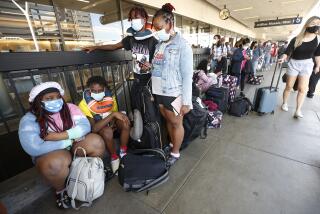U.S. Must Decide If It Will Seek Air Pact Course Shift
- Share via
President Clinton is flying to Japan next week to discuss, among other things, how often U.S. airlines can fly to Japan--and his visit already has spawned one of the most heated disputes within the airline industry in recent years.
At issue is whether Clinton, who meets with Japanese Prime Minister Ryutaro Hashimoto on Tuesday, should try to reopen a 44-year-old aviation pact between the countries.
The agreement restricts how often U.S. passenger carriers can fly to Japan as well as how often they can pick up travelers in Japan and fly them elsewhere in Asia--services that are known as “beyond rights.”
The only two U.S. airlines that now have those beyond rights, Northwest and United, want the status quo (which also restricts the rights of Japan Airlines and other Japanese carriers to fly beyond the U.S. West Coast).
But several other carriers, led by American and Delta, are itching for more access to Japan and beyond.
It’s a debate with big implications for travelers on both sides of the Pacific Ocean, partly because the group seeking more access contends passengers’ fares would drop sharply if there’s more competition.
It’s also a critical debate for Los Angeles International Airport, a key hub of U.S.-Asian travel and gateway for Asians visiting Disneyland, Hollywood and other Southern California tourist attractions.
Indeed, the lobby led by American and Delta, known as Access U.S.-Japan, plans to release a study today asserting that the current restrictions “have a stranglehold on California’s travel and tourism economy.”
Assuming more competition, a 10% drop in average fares between California and Japan would generate 129,000 more travelers and add $637 million to the California economy every year, the study maintains.
The study is only part of a fierce public relations campaign being waged by both sides. The head of Access U.S.-Japan, former Virginia Gov. Gerald L. Baliles, has crisscrossed the country seeking support. The group has also used research from accounting giant Coopers & Lybrand to support its claims, and said it has several hundred tourism groups, state agencies, hotels, restaurants and others behind its cause.
Northwest and United have trotted out their own studies that contend the new talks with Japan could ultimately leave the United States with less access, thus hobbling U.S. travelers with fewer flights and higher fares.
Northwest and the others also assert that Access U.S.-Japan is being Pollyannaish about the prospects for freer skies and is actually playing into Japan’s hard-line stance on aviation rights by proposing that the 1952 agreement be renegotiated. They’ve called the group “Japan’s Trojan Horse.”
Why are Northwest and United objecting to more competition on the U.S.-Japan routes?
“We’re absolutely for what’s called ‘open skies,’ ” or complete deregulation and free competition, said Elliott M. Seiden, vice president for law and government affairs at Minneapolis-based Northwest.
But he said Japan will never let that happen.
In fact, Seiden and others said Japan has made no secret that it wants more restrictions because U.S. carriers now carry a dominant 66% of the 11 million people who fly between the United States and Japan each year, which creates a $4.8-billion trade surplus for the United States, he said.
“You’re talking about a situation where Japan looks at those numbers and is trying to cut access back,” Seiden said. “The U.S. is saying we want to expand access, but that isn’t going to happen. So we have to start looking at what is the second-best option.”
Which is: protecting the agreement now in place. Northwest, United and its supporters worry that if the president “puts in play a curtailing of [our] rights, who knows where that will come out?”
So what will Clinton seek from Hashimoto? The White House referred the question to the U.S. Trade Representative’s office, but officials there were not immediately available to comment Wednesday.
But industry sources said privately that U.S. trade negotiators are urging the American carriers to find common ground on the issue, or risk leaving the negotiators with a divided, weakened position when they sit down with their Japanese counterparts.
More to Read
Sign up for The Wild
We’ll help you find the best places to hike, bike and run, as well as the perfect silent spots for meditation and yoga.
You may occasionally receive promotional content from the Los Angeles Times.







